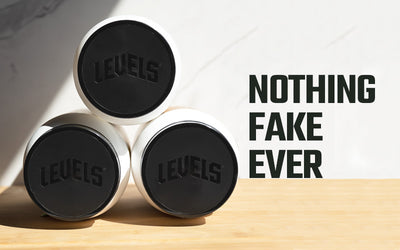For the past 20 years, creatine has been a bestselling supplement in the health and fitness world.
And for good reason: few supplements are as safe, or as well-supported by credible research.
But what’s the best method to take it, and how should you time your creatine dose? Instead of relying on bro-science, we’ve done a deep dive into peer-reviewed research.
Keep reading to learn the basics about creatine, all the reasons to consider taking it, and everything you need to know about timing your creatine intake.
What is Creatine?
Creatine is a popular sports supplement, as well as a naturally-occurring compound your body uses for energy production during physical activity.
Dietarily, you can obtain creatine from foods like steak (which contains about 3 grams per pound when cooked rare), but it’s not an essential nutrient[*]. In other words, your body can still produce enough creatine to survive, even if you obtain little or none from your diet.

Your body makes creatine from the amino acids arginine, glycine, and methionine. Your kidneys and liver are the major producers of creatine, making around 1 gram per day from the foods you eat[*].
Approximately 95% of the creatine in your body occurs in your muscles, while the remaining 5% is found in the brain, liver, kidney, and (for men) testes[*].
How Does Creatine Work?
In your body, creatine’s primary role is to recycle energy.
During high-intensity muscle contractions (for example, weight training or sprinting), the high-energy molecule adenosine triphosphate (ATP) is broken down into a less-energetic molecule called adenosine diphosphate (ADP).
After about 10 seconds of strenuous activity, a lack of available ATP reduces your power output. In other words, without enough ATP to fuel muscle cells, your body slows down and becomes less explosive.
However, the creatine inside your muscle cells helps increase the energy available to your muscles.
As creatine does its job, it transfers phosphate groups to ADP molecules, which helps convert them back to ATP. As a result, creatine in your muscles changes rapidly from phosphocreatine to free creatine during activity, then back again[*].
By helping to recycle ADP back into ATP, creatine gives your body the ability to generate a higher power output and sustain it for extended periods.
Not only that, but when you take creatine orally as a supplement, it elevates your body’s creatine levels far more effectively than diet and natural production alone.
For example, whereas a 154-pound male typically has about 120-140 grams of creatine in his body naturally, the same individual could attain total creatine levels upwards of 230 grams through supplementation[*][*].
Subscribe to get the latest advice, sales, discounts, product drops and more. Join now and get 15% off your first order.
Why Take Creatine? 4 Benefits of Creatine
1. Safe and Well-Studied
Hundreds of studies have examined creatine in a variety of people, from infants to senior citizens, and haven’t found any serious adverse effects[*].
For healthy individuals, research suggests taking a whopping 30 grams per day of creatine is safe for 5 years or longer[*].
That said, if you have a medical condition, especially a liver or kidney issue, be sure to consult your doctor before taking creatine.
2. Provides Extra Energy for Muscles
Taking creatine raises your phosphocreatine levels, which helps recycle energy during strenuous exercise[*][*].
That’s why creatine enables you to sprint longer and faster, lift heavier, and perform extra reps[*][*].
3. Helps Add Lean Muscle
When combined with resistance training, creatine helps you add more lean muscle mass[*].
Because it enables you to move heavier weights in the “strength-and-muscle-building” (5-10 repetition) range, creatine probably enhances muscle-building by allowing you to accumulate more muscle fiber breakdown during exercise[*].
Researchers also think creatine can increase your muscle growth in other ways, such as directly elevating muscle protein synthesis, inhibiting myostatin, or elevating growth factors like IGF-1[*][*][*].
4. Boosts Brain Health and Protects Against Traumatic Brain Injuries
Taking creatine may boost mental performance, especially in sleep-deprived or aged individuals[*].
Creatine supplementation also helps protect brain cells from damage, and may reduce brain damage from traumatic brain injuries by up to 50%[*].
How to Take Creatine
Creatine Dosage
Studies show that taking 3-10 grams per day of creatine is a highly effective supplementation strategy[*][*].
At Levels, we recommend most people take 5 grams of creatine daily to enhance exercise performance.

But if you’re a larger-than-average person, or don’t notice benefits with 5 grams per day, go ahead and try taking 10 grams of creatine daily.
While it’s actually safe for healthy individuals to take up to 30 grams per day for extended durations, such high doses are overkill for performance enhancement[*].
However, some evidence suggests large doses of creatine could reach the brain and other non-muscle tissues more effectively[*]. That means if you are using it for neuroprotection or to help recover from an illness, experimenting with higher doses may be helpful[*].
To obtain the benefits of creatine with fewer minor side-effects (like bloating or upset stomach), divide your total daily dose into smaller doses of 5 grams, evenly spaced throughout the day.
Loading Phase
Many people use a loading phase — higher daily doses of creatine for about a week — to get their muscle creatine levels higher in a shorter amount of time.
Whereas lower daily doses of 3-5 grams take about one month to build up in your muscles, taking 20-30 grams per day for 5-7 days allows you to enhance your performance more rapidly[*].

On the other hand, higher daily doses are more likely to cause minor adverse effects like bloating or upset stomach[*].
Therefore, if you notice any side effects while loading creatine, feel free to skip the loading phase and go straight to 5 grams per day. Within a few weeks to a month, your muscles will be saturated with creatine, anyway.
Pairing Creatine With Other Supplements
Whey protein or fast-acting carbohydrates like sugar or dextrose can enhance muscle creatine absorption by raising insulin levels[*].
Does better absorption mean better results? Some studies show an added performance benefit to taking creatine with whey or carbs, while others don’t[*].
Regardless, if you’re consuming a whey shake or carbs anyway, there is no downside to timing your creatine intake accordingly.
How Long to Take Creatine
If you don’t have any medical conditions, you can take creatine daily for years with no serious adverse effects[*].


When to Take Creatine
Should you take creatine before or after a workout? Or is there a more optimal time to take your creatine dose? Here’s what the best scientific evidence says about timing your creatine intake:
- Consuming creatine after weight training works better than pre-workout, possibly due to elevated muscle blood flow[*][*]
- Whey protein enhances muscle creatine absorption[*]
- Creatine absorbs better when paired with a high-carb meal (94 grams of carbs per 5 grams of creatine) or paired with about 50 grams each of carbs and protein[*]
- Taking creatine during a meal may work better than an empty stomach[*]
Therefore, the very best time to take creatine is post-workout, with your whey protein shake.
Whether or not your post-workout shake includes carbs will depend on your overall goals.
During rest days, simply take your creatine with any meal, whenever it’s most convenient.
The Bottom Line: Does Creatine Timing Matter?
Creatine is affordable, safe, and scientifically proven to enhance your performance and help deliver better results.
But in the end, how important is creatine timing?
In a nutshell, the timing of your daily creatine dose won’t make or break your entire fitness regimen.
However, as we learned today, timing your creatine intake correctly is ridiculously easy, and may enhance your results further.
And at Levels, we believe that optimizing your approach to health and fitness, even for a “small” edge of just 1-5%, is well worth it.







